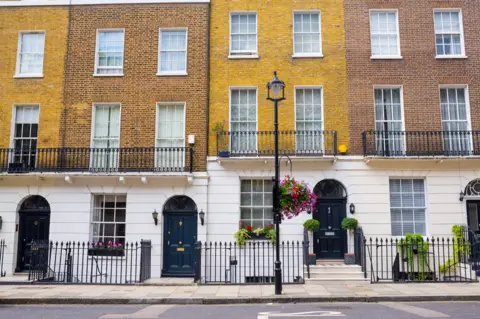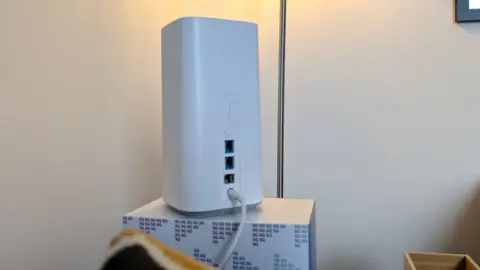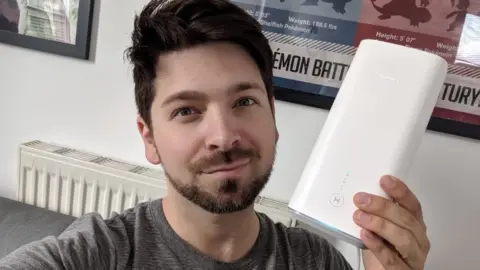BBC News tries out Three's 5G for the home
 Getty Images
Getty ImagesThree has launched its 5G service for the home, initially available to residents of certain areas of London only.
The network's UK chief executive, David Dyson, has previously said he believes 5G has the potential to end the need for fixed broadband.
However, in a trial offered to BBC News prior to the public launch, the signal was found to be flaky.
Three said it was investigating why problems had been experienced.
A spokeswoman told BBC News the company had received positive feedback from others who had taken part in its beta tests.
"We appreciate the feedback on the initial testing pre-launch and as part of our ongoing commitment to ensure all customers receive a great 5G home broadband experience, we will be constantly optimising and enhancing the service to ensure customers benefit from our expanding 5G rollout," she said.
Allow X content?
CCS Insight analyst Ben Wood said the launch marked a "tentative step" into the 5G market for Three in the UK.
"Three UK is in pole position when it comes to its potential with 5G, given the huge slice of spectrum it owns," he said.
"The 100MHz of contiguous spectrum is the optimal package when it comes to rolling out 5G technology.
"This is a first toe in the water for the 5G service and I guess we will really find out what Three can offer when the wider 5G network is turned on and you can use it with a smartphone."


I haven't got a landline telephone in my house and haven't had one since I moved out of the family home, when I was 18.
But I still have to pay line rental just to use the internet, so the idea of "cutting the cord" completely is very appealing.
Three let me borrow one of its new 5G routers over the weekend to try out its wireless home broadband service.

5G is fast enough to make it a serious competitor for fixed-line broadband.
A test suggested I could expect download speeds of 250Mbps, making it faster than my current broadband.
But 5G's challenge is signal penetration - the higher frequency signals struggle to access the home.
To help with that, it comes with a bulky router. Big by modern standards, it is, after all, a massive antenna.
Three sent an engineer to help find the best place for it in my home.
It worked best on a corner table, balanced on top of its packaging, with the back of the unit facing into the room. It worked as a temporary solution but would not be particularly elegant long term.
All in all, the set-up took only a few minutes and service was up and running straight away. I chose a film from a film-streaming service to put the 5G through its paces.
The film played almost immediately - impressive. But half an hour in, the film started buffering. The 5G light on the router had gone out and it had switched back to the slower 4G network.
The 5G did come back but the router soon dropped down to 4G again. This back and forth continued for a while and, frustrated, I ended up switching back to my old fixed-line broadband to finish the film.

For 5G to be a viable alternative to fixed-line broadband, the coverage needs to be rock solid.
And then there's the cost. At £35 a month, it's more expensive than unlimited fixed-line broadband.
My trusty fixed-line router hidden away in a cabinet no longer seems so unappealing.
